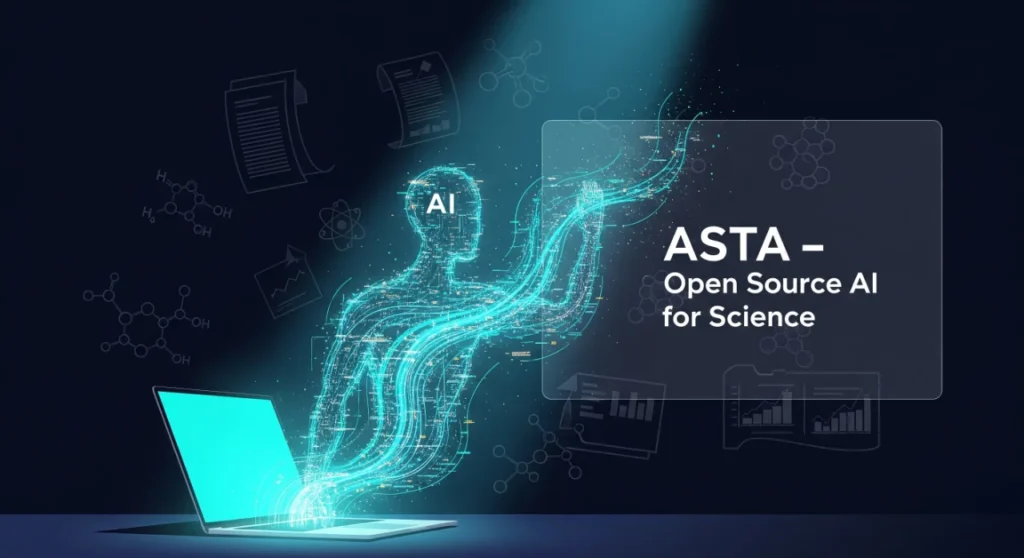A new AI project out of Seattle is aiming to do more than draft emails.
The Allen Institute for AI (Ai2) has launched Asta, an open-source platform that lets researchers build autonomous AI agents to analyze data, test hypotheses, and cite sources — a potential game-changer for science.
Key Takeaways
- Ai2 launches Asta, an open-source AI platform for scientific research.
- Asta agents analyze papers, generate hypotheses, and cite verified sources.
- Researchers can test tools using AstaBench, a real-world benchmark suite.
- Project builds on Semantic Scholar and Ai2’s open-source AI ethos.
- Nvidia and NSF back Ai2 with $152M to lead U.S. science AI backbone.
Asta is a new open-source AI platform from the Allen Institute for AI that helps researchers create specialized agents to analyze data, summarize studies, generate hypotheses, and cite sources. Backed by Ai2’s Semantic Scholar database, Asta aims to accelerate scientific discovery while keeping AI grounded in evidence.
A Bold Bet on AI for Science
The Allen Institute for AI (Ai2), a nonprofit founded by Microsoft co-founder Paul Allen, has launched Asta, a new open-source platform designed to help researchers accelerate breakthroughs by creating AI agents that “think like scientists.”
Announced this week in Seattle, Asta is positioned not as another productivity tool, but as a collaborator for researchers facing complex scientific challenges.
How Asta Works
The project has three main components:
- Asta Agents: Specialized assistants that can find relevant studies, analyze complex datasets, summarize literature, generate testable hypotheses, and provide traceable citations.
- AstaBench: A benchmark suite for stress-testing and ranking AI agents on real-world research problems.
- Asta Resources: A toolkit for developers to build scientific agents on top of Ai2’s open infrastructure.
Ai2’s chief scientist Dan Weld described Asta as “not just another assistant but a collaborator designed to think like a scientist.”
Built on Semantic Scholar’s Backbone
Asta extends Ai2’s long-running Semantic Scholar project, which already indexes more than 200 million scientific papers. Agents created with Asta can directly access this vast database via a “Scientific Corpus Tool,” grounding their outputs in verifiable research rather than speculation.
By keeping Asta open-source, Ai2 hopes to create a flywheel of improvement — where scientists and developers can both build agents and test them against shared benchmarks, driving collective progress.
Why It Matters
Consumer-facing AI products like ChatGPT and Anthropic’s Claude have dominated headlines, but they aren’t optimized for research-grade rigor. Asta aims to fill that gap by holding AI to scientific standards of transparency, reproducibility, and evidence-based reasoning.
Ai2 CEO Ali Farhadi framed Asta as a bet on “a future where AI doesn’t just keep up with science, it helps drive it forward.”
Recent Momentum at Ai2
The launch of Asta caps a particularly busy month for Ai2. The institute recently announced:
- A new AI robotics initiative to explore intelligent automation.
- A $152 million grant from Nvidia and the U.S. National Science Foundation to develop the backbone of future AI-driven scientific research.
- A move into a new mass-timber office space near Seattle’s Lake Union.
These developments underline Ai2’s growing role as a nonprofit counterweight to Silicon Valley’s commercial AI labs.
Open-Source First Philosophy
Unlike OpenAI or Anthropic, Ai2’s strategy is to keep its AI models and infrastructure fully open-source. Recent releases include OLMo (open language models), Molmo (multimodal models), and Tülu (instruction-tuned models).
By combining that ethos with a platform explicitly designed for researchers, Ai2 is reinforcing its position as one of the few global players building AI for science-first, not product-first outcomes.
The Bigger Picture
As industries debate whether AI threatens entry-level research jobs, Ai2 stresses that Asta is designed as a collaborator, not a replacement. Still, the project raises important questions: if AI agents can analyze literature and generate hypotheses at scale, how will human scientists adapt their roles?
Ai2 is betting that freeing researchers from routine data tasks will allow them to focus on creativity, design, and breakthrough thinking.
What Happens Next
Asta is still in its early days, but Ai2 hopes the open-source community will extend it much like Linux or TensorFlow in previous generations of technology. With Nvidia’s backing and global academic interest, the platform could become a new standard for AI-driven science.
Conclusion
Ai2’s Asta is an ambitious attempt to give scientists AI partners that are transparent, evidence-grounded, and open-source. If successful, it could reshape not just how research is conducted but also who gets to participate in cutting-edge science.
